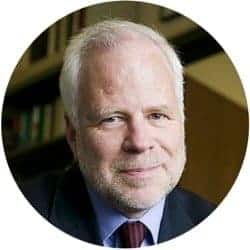
Barry Eichengreen
With Emmanuel Macron’s victory in the French presidential election, and Angela Merkel’s Christian Democratic Union enjoying a comfortable lead in opinion polls ahead of Germany’s general election on September 24, a window has opened for eurozone reform. The euro has always been a Franco-German project. With a dynamic new leader in one country and a fresh popular mandate in the other, there is now an opportunity for France and Germany to correct their creation’s worst flaws.
But the two sides remain deeply divided. Macron, in long-standing French tradition, insists that the monetary union suffers from too little centralization. The eurozone, he argues, needs its own finance minister and its own parliament. It needs a budget in the hundreds of billions of euros to underwrite investment projects and augment spending in countries with high unemployment.
Merkel, on the other hand, views the monetary union’s problem as one of too much centralization and too little national responsibility. She worries that a large eurozone budget wouldn’t be spent responsibly. While not opposed to a eurozone finance minister, she does not envision that official possessing expansive powers.
But there is a narrow path forward that should be acceptable to both sides. It starts with completing the banking union. Europe now has a single supervisor in the European Central Bank, but it lacks a common deposit insurance scheme, which German officials oppose on the grounds that there has been inadequate risk reduction in the European banking system. In other words, they worry that the fees levied on German banks will be used to pay off depositors in other countries.
The solution lies in bulletproofing the banks by strictly applying the demanding capital standards of Basel III and limiting concentrated holdings of government bonds. The paradox here is that European regulators, including German regulators, have in fact been arguing for looser application of those regulations in negotiations with the United States. In doing so, they have been arguing against their own best interests.
Next, Europe needs to transform the European Stability Mechanism, its proto-rescue fund, into a true European Monetary Fund (EMF). Its resources could be augmented by increasing governments’ capital subscriptions and expanding its ability to borrow. Decision-making could be streamlined by moving from the current unanimity rule to qualified majority voting.
The EMF could then take the place of the ECB and the European Commission in negotiating the terms of financing programs with governments. The final decision of whether to extend an emergency loan would no longer fall to heads of state in all-night talks. Rather, it would be taken by a board made up of eurozone representatives, including from civil society, nominated by the European Council and confirmed by the European Parliament, giving the process a legitimacy it currently lacks.
But Germany will agree only if it sees steps limiting the likelihood of expensive intervention. This brings us to the vexed question of fiscal policy. It is past time to abandon the fiction that the ultimate source of fiscal discipline is a set of strictly enforced EU rules. Taxation and public spending remain sensitive national prerogatives, rendering outside oversight ineffectual. Assigning oversight to the European Commission in Brussels promises, inevitably, not discipline but a dangerous populist backlash.
The alternative is to return control of fiscal policy to national governments, abandoning the pretense that policy can be regimented by EU rules. Governments could then make their own decisions; if they make bad decisions, they will have to restructure their debts. Adopting a European debt-restructuring mechanism would help to avoid the worst fallout. Any adverse consequences would no longer spread to other countries, because their banks would no longer hold concentrations of government bonds. They would not bankrupt the EMF, which would be able to lend only in cases of illiquidity, not insolvency.
Barry Eichengreen is Professor of Economics and Political Science at the University of California, Berkeley and formerly Senior Policy Adviser at the International Monetary Fund.

These ideas will horrify dedicated euro-federalists. One bone they can be thrown is a pilot unemployment insurance fund amounting to, say, 1% of eurozone GDP. This would be analogous to US arrangements under which the federal government provides partial funding for state-administered unemployment insurance. And it would give the eurozone finance minister something to do. If the initial modest program was shown to work, it could be scaled up.
But German politicians are aware that unemployment is 2.5 times higher in France than at home, raising the danger that transfers would all go one way. That’s why such proposals are contingent on structural reforms that reduce unemployment where it is high and increase the flexibility of labor and product markets.
This is essentially the bargain Macron has offered Merkel. To paraphrase, “I’ll undertake deep structural reforms if you agree to modest steps in the direction of fiscal federalism, completing the banking union, and creating a European Monetary Fund.”
No one on either side of the Rhine will regard this bargain as perfect. But with the euro in the balance, the perfect should not be allowed to become the enemy of the good.
Republication forbidden. Copyright: Project Syndicate 2017 The Euro’s Narrow Path